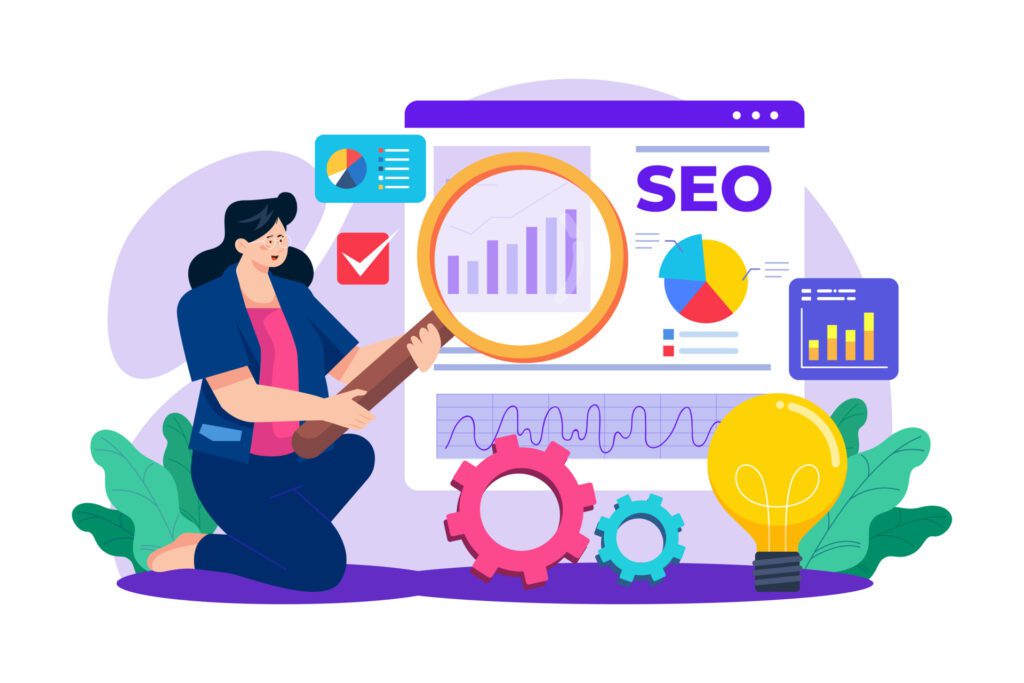Businesses must adopt effective local SEO content strategies to enhance their online visibility and attract nearby customers. Local SEO focuses on optimizing a website to increase traffic, leads, and brand awareness from local search results. This article will delve into various aspects of local SEO content strategy, including how to effectively implement it for different industries such as eCommerce, healthcare, and chiropractors, as well as the importance of Google My Business.
Understanding Local SEO
Local SEO is a subset of search engine optimization (SEO) that targets local customers based on their geographic location. It involves optimizing your online presence to attract more business from relevant local searches. This is particularly important for businesses that rely on local customers, such as restaurants, service providers, and retail stores.

Key Components of Local SEO
- Google My Business (GMB): A critical element of local SEO, GMB is a free tool that allows businesses to manage their online presence across Google, including Search and Maps. A well-optimized GMB listing can significantly improve local search visibility.
- Local Keywords: Incorporating local keywords into your content strategy helps search engines understand your geographical focus. This includes city names, neighborhoods, and other relevant local terms.
- Local Reviews: Customer reviews and ratings on Google and other platforms play a vital role in local SEO. Positive reviews not only enhance your reputation but also improve your ranking in local searches.
- On-Page SEO: Optimizing your website’s on-page elements, such as title tags, meta descriptions, headers, and content, is crucial for local SEO success.
- Local Link Building: Acquiring backlinks from local websites, organizations, and directories can improve your authority and relevance in local search results.
Developing a Local SEO Content Strategy
Creating a robust local SEO content strategy involves several steps, including research, keyword optimization, content creation, and promotion. Below, we outline a comprehensive approach to developing a successful local SEO content strategy.

Step 1: Conduct Local Keyword Research
Keyword research is the foundation of any successful SEO strategy. For local SEO, focus on identifying keywords that include local terms and phrases relevant to your business. Use tools like Google Keyword Planner, Ahrefs, or SEMrush to discover keywords with local intent.
Example Keywords:
- “local SEO content strategy”
- “local SEO for eCommerce”
- “Google My Business SEO services”
- “local SEO for healthcare”
- “local SEO for chiropractors”
- “local SEO marketing Fort Lauderdale”
Step 2: Optimize Google My Business
Your Google My Business listing is one of the most important elements of local SEO. Ensure that your listing is fully optimized by providing accurate and up-to-date information, including:
- Business name
- Address and phone number
- Website URL
- Business hours
- Categories and services
- High-quality images
Encourage satisfied customers to leave positive reviews on your GMB listing, as these can significantly impact your local search rankings.
Step 3: Create Localized Content
Developing high-quality, localized content is crucial for engaging your audience and improving your local SEO. Here are some content ideas:
- Blog Posts: Write blog posts that address local topics, events, and news in your industry. For example, a local eCommerce business might write about “The Best Local Products to Buy This Holiday Season.”
- Case Studies and Testimonials: Share success stories from local clients to build trust and credibility. This type of content resonates well with potential customers.
- Local Guides: Create comprehensive guides for your local area, such as “The Ultimate Guide to Healthcare Services in [City Name].” This positions your business as an authority in your community.
- Event Coverage: If your business participates in local events, create content around those events, including summaries, photos, and testimonials.
- FAQs: Develop a frequently asked questions section that addresses common inquiries from local customers.
Step 4: On-Page SEO Optimization
Optimize your website’s on-page elements to align with your local SEO strategy. Here are some key aspects to focus on:
- Title Tags and Meta Descriptions: Include local keywords in your title tags and meta descriptions to improve click-through rates.
- Header Tags: Use header tags (H1, H2, H3) to structure your content and incorporate local keywords naturally.
- Content: Ensure your content is informative, relevant, and optimized for local keywords without keyword stuffing.
- Internal Linking: Utilize internal links to connect related content on your website, improving user navigation and SEO.
Step 5: Local Link Building
Building local backlinks is essential for boosting your authority in local search results. Here are some strategies for acquiring local links:
- Local Partnerships: Collaborate with other local businesses, organizations, or influencers to create co-branded content or events that can generate backlinks.
- Local Directories: Submit your business to reputable local directories, such as Yelp, Yellow Pages, and industry-specific directories.
- Sponsorships and Donations: Sponsor local events, charities, or sports teams, and ensure your business is mentioned on their websites.
- Guest Blogging: Offer to write guest posts for local blogs or publications, providing valuable content in exchange for a backlink.
Local SEO for Various Industries
1. Local SEO for eCommerce
E-commerce businesses can benefit significantly from local SEO by targeting customers in specific geographic areas. Here are some strategies:
- Localized Product Pages: Create product pages that target local keywords, such as “Buy [Product] in [City].”
- Local Promotions: Offer promotions or discounts specifically for local customers to encourage in-store purchases or local deliveries.
- Customer Reviews: Encourage local customers to leave reviews on product pages, enhancing credibility and improving local search visibility.
2. Google My Business SEO Services
Utilizing Google My Business effectively is paramount for local SEO success. Consider the following:
- Regular Updates: Keep your GMB listing updated with new photos, posts, and offers to engage potential customers.
- Utilize Q&A: Actively manage the Q&A section of your GMB listing to address common customer inquiries and showcase your expertise.
- Insights and Analytics: Use GMB insights to understand how customers interact with your listing and adjust your strategy accordingly.
3. Local SEO for Healthcare
Healthcare providers can leverage local SEO to attract patients in their area:
- Local Keyword Focus: Use keywords like “family doctor in [City]” or “urgent care [City]” to target local patients.
- Patient Testimonials: Showcase patient testimonials and success stories to build trust and credibility with potential patients.
- Informative Content: Create content that addresses local health issues, events, or services, positioning your practice as a community resource.
4. Local SEO for Chiropractors
Chiropractors can enhance their visibility through targeted local SEO strategies:
- Local Listings: Ensure your practice is listed in local directories and health-related websites.
- Educational Content: Create blog posts or videos addressing common chiropractic concerns and local health events.
- Community Engagement: Participate in local health fairs or workshops to enhance visibility and establish authority in the community.
5. Local SEO Marketing in Fort Lauderdale
For businesses operating in Fort Lauderdale, consider these strategies:
- Localized Content: Create content that highlights local events, attractions, and news relevant to your industry.
- Networking: Connect with other local businesses and organizations to build relationships and collaboration opportunities.
- Targeted Advertising: Utilize local advertising options, such as Google Ads and Facebook Ads, to target customers specifically in the Fort Lauderdale area.
Continuing the Exploration of Local SEO Content Strategy
In this continuation, we will delve deeper into specific tactics to enhance local SEO for various industries, provide additional content strategies, and discuss the importance of measuring and analyzing your local SEO efforts.
Advanced Local SEO Techniques

Advanced Content Strategies for Local SEO
- Create Location-Specific Landing Pages:
- If your business operates in multiple locations, create dedicated landing pages for each area. Each page should include locally relevant content, such as addresses, service descriptions, and local keywords.
- Example: A plumbing service might have separate pages for “Plumber in Downtown,” “Plumber in Eastside,” etc., each optimized with local content and keywords.
- Utilize Schema Markup:
- Implementing local business schema markup helps search engines understand your business information better, which can improve your visibility in local search results.
- Use structured data to define your business name, address, phone number, operating hours, and services offered.
- Example: html
<script type="application/ld+json"> { "@context": "http://schema.org", "@type": "LocalBusiness", "name": "Your Business Name", "address": { "@type": "PostalAddress", "streetAddress": "123 Main St", "addressLocality": "Fort Lauderdale", "addressRegion": "FL", "postalCode": "33301" }, "telephone": "+1-954-555-1234", "openingHours": "Mo-Fr 09:00-17:00" } </script>
- Leverage User-Generated Content:
- Encourage customers to share their experiences and content related to your business. This could include photos, testimonials, or reviews.
- Feature user-generated content on your website and social media, as it enhances engagement and trust.
- Video Content:
- Create localized video content that showcases your products, services, or community involvement. Videos can improve engagement and can be shared across multiple platforms.
- Example: A local restaurant could create a video series highlighting local farmers who supply their ingredients.
- Host Local Events and Webinars:
- Organize events, workshops, or webinars that cater to your local audience. Promote these events on your website and social media, and create content that showcases the event afterward.
- This not only builds community connections but also generates local backlinks.
Local SEO for Specific Industries
Local SEO for Restaurants
- Menu Optimization:
- Ensure your menu is accessible online and optimized with local keywords. Consider using structured data for menu items.
- Example: Include dishes that feature local ingredients or are named after local landmarks.
- Local Promotions:
- Run promotions that target local customers. Use local keywords in your promotions, such as “Happy Hour in [City Name].”
- Engagement on Social Media:
- Actively engage with local customers on platforms like Instagram and Facebook. Share user-generated content and respond to reviews promptly.
Local SEO for Real Estate
- Neighborhood Guides:
- Create guides for neighborhoods, detailing amenities, schools, parks, and local attractions. This helps potential buyers understand the area better.
- Example: A real estate agent might write a blog post titled “Top 10 Reasons to Move to [Neighborhood Name].”
- Market Updates:
- Share local market updates, trends, and statistics. This positions you as a knowledgeable authority in the local real estate market.
- Virtual Tours:
- Provide virtual tours of properties on your website and social media. Optimize these videos with local keywords.
Importance of Local Reviews
Encouraging and managing customer reviews is vital for local SEO. Positive reviews improve your online reputation and can influence local search rankings. Here’s how to effectively manage reviews:
- Encourage Reviews:
- Ask satisfied customers to leave reviews on Google, Yelp, and other relevant platforms. Consider following up with an email after a purchase or service completion.
- Respond to Reviews:
- Engage with all reviews, positive or negative. Thank customers for positive feedback and address any concerns raised in negative reviews. This shows that you value customer feedback and are committed to improving your services.
- Utilize Reviews in Content:
- Feature positive reviews and testimonials on your website and social media. This not only builds trust but also serves as valuable content.
Measuring Local SEO Success
To understand the effectiveness of your local SEO content strategy, you need to monitor and analyze your performance. Here are key metrics to track:
- Google My Business Insights:
- Utilize GMB insights to track how customers interact with your listing, including how they found your business and what actions they took (e.g., calls, website visits).
- Website Traffic:
- Use Google Analytics to monitor traffic to your website, paying special attention to organic traffic from local searches.
- Keyword Rankings:
- Track the rankings of your targeted local keywords. Tools like Moz, SEMrush, or Ahrefs can help you monitor your keyword performance.
- Conversion Rates:
- Analyze conversion rates from local traffic. Are local visitors making inquiries, purchases, or signing up for your newsletter? Use conversion tracking in Google Analytics to measure success.
- Review Metrics:
- Monitor the number and quality of reviews you receive over time. Tools like Google Alerts can help you stay informed about new reviews.
Continuous Improvement
Local SEO is an ongoing process that requires continuous improvement and adaptation. Here are some tips to ensure your local SEO strategy remains effective:
- Stay Updated: Keep abreast of changes in local SEO best practices and algorithm updates to ensure your strategies remain relevant.
- Regular Content Updates: Continuously update and refresh your content to keep it relevant and engaging. Add new blog posts, update service pages, and refresh local guides.
- Engagement: Regularly engage with your audience through social media, email newsletters, and community events. Building relationships with local customers fosters loyalty and encourages word-of-mouth referrals.
- A/B Testing: Experiment with different content formats, keywords, and promotional strategies. Use A/B testing to determine what resonates best with your audience.
A well-planned local SEO content strategy is essential for businesses aiming to enhance their visibility and attract local customers. By understanding the unique needs of your industry and implementing targeted content strategies, you can improve your chances of ranking higher in local search results.Whether you’re a restaurant, healthcare provider, or eCommerce business, tailoring your local SEO efforts to your audience will yield positive results. With the right approach, you can build a strong online presence that fosters community engagement and drives more foot traffic to your business.As you implement these strategies, remember that local SEO is not a one-time effort. It requires ongoing attention, adaptation, and commitment to provide the best possible experience for your local customers.




